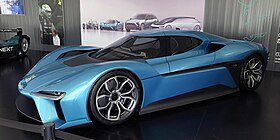Nio EP9
| NIO EP9 | |
|---|---|
 | |
| Overview | |
| Manufacturer | NIO NextEV NIO Formula E Team |
| Also called | NextEV EP9 |
| Production | 2016-present |
| Body and chassis | |
| Class | Track day car Sports car (S) electric car |
| Body style | 2-door coupé |
| Layout | individual-wheel drive |
| Related | Rimac Concept One Lola-Drayson B12/69EV |
| Powertrain | |
| Electric motor | Indirectly water-cooled motors (one motor at each wheel) |
| Power output | 335.25 hp (250 kW) each wheel 1,341 hp (1 MW; 1,360 PS) total |
| Transmission | 4 individual single-ratio transmissions (one gearbox at each wheel) |
| Battery | lithium ion batteries |
| Electric range | 427 km (265 mi) |
| Dimensions | |
| Length | 4,888 mm (192.4 in) |
| Width | 2,230 mm (88 in) |
| Height | 1,150 mm (45 in) |
| Curb weight | 1,735 kg (3,825 lb) |

The NIO EP9 is an electric-powered, two-seat sports car manufactured by NIO, assisted by their Formula E racing division. It holds several track records.
History
Developed and built in 18 months, the EP9 debuted at the Saatchi Gallery in London, England.[1]
Six EP9s have been sold to NIO investors for US$1.2 million each. NIO has announced that ten additional EP9s will be sold to the general public.
Specifications
Each of the EP9's wheels has its own motor and transmission. Each motor has 335.25 horsepower, giving the car a total power output of 1,341 hp (1 MW; 1,360 PS). The EP9 is both all-wheel drive,[2] and individual-wheel drive. The car has an advanced torque vectoring system that can adjust the power output to each wheel.
The EP9's battery can last up to 427 km (265 mi) before it needs to be charged. Recharging takes 45 minutes, and battery replacement takes 8 minutes.
The car is equipped with an active suspension, including a ride height controller that makes 200 calculations per second.[3]
The car's brakes are constructed and developed in house by NextEV.
The car's chassis construction is all carbon fibre, and is based on the FIA Le Mans Prototype regulations. The exterior is also made of the same material.
The vehicle's batteries weigh 635 kg (1,400 lb). All of the carbon fibre in the car, in total, weighs 364 kg (802 lb). The total weight of the car is 1,735 kilograms (3,825 lb).[2]
Performance
The EP9 can accelerate from 0-62 mph (100 km/h) in 2.7 seconds, 200 km/h (0-124 mph) in 7.1 seconds, and 300 km/h (0-186 mph) in 15.9 seconds. The car can achieve a top speed of 313 km/h (194 mph).[2]
Design
Exterior
The EP9's rear wing is adjustable between three settings: parked, low-drag, and high-downforce.[2] The EP9 produces 24,000 newtons (5,395 lbs or 2447 kg) of downforce at 240 km/h (150 mph), similar to a Formula One car, allowing the EP9 to corner at 3.0 Gs.[2]
Interior
The interior, like the exterior and chassis, is made entirely of carbon fiber.[4] There are four screens: one on the driver's side of the dashboard, one on the passenger's side of the dashboard, one on the center console, and one on the steering wheel.[5][6][7]
- Dashboard screens - Both screens display performance data, but differ in function. The passenger-side screen displays only four measurements: the car's top speed, lap time, and lateral G-forces, and the driver's heart rate.
- Center console screen - Displays performance data, lap times, and a track map with the car's current position.
- Steering wheel screen - The steering wheel is a simplified version of NextEV's Formula E racing wheel, and is built by the same company.
World records
The EP9 set the record the fastest lap by an electric vehicle for the Circuit of the Americas, Shanghai International Circuit and the Circuit Paul Ricard tracks. It also set the record for the fastest lap by an autonomous vehicle at the Circuit of the Americas track.
| Track | Lap Time | References |
|---|---|---|
| Nürburgring Nordschleife | 6:45.90 | [8][9][10] |
| Circuit Paul Ricard | 1:52.78 | [11] |
| Circuit of the Americas | 2:11.30 (driver) 2:40.33 (auto) |
[12][13] |
| Shanghai International Circuit | 2:01.11 | [14] |
The EP9 used racing slicks, so the published times are not comparable to those by cars in street-legal states.[15]
See also
References
- ^ DPCcars (2016-11-22), NextEV NIO EP9 With 1341 Horsepower Unveiling, retrieved 2017-02-23
- ^ a b c d e "NextEV's NIO EP9 is an incredible four-wheel-drive electric hypercar". Wired.co.uk. Retrieved 2017-02-21.
- ^ caroto_gr (2016-11-27), NextEV Nio EP9 - 1 360hp World’s Fastest Electric Car, retrieved 2017-02-23
- ^ FIA Formula E Championship (2016-12-04), NIO EP9: The Fastest EV Supercar In The World - Formula E, retrieved 2017-02-23
- ^ "2017 NIO EP9 - Image #11". Caricos.com. Retrieved 2017-02-24.
- ^ "2017 NIO EP9 - Image #15". Caricos.com. Retrieved 2017-02-24.
- ^ "2017 NIO EP9 - Image #17". Caricos.com. Retrieved 2017-02-24.
- ^ "NIO EP9 Breaks the Nurburgring Nordschleife Lap Record". nio.io. Retrieved 2017-05-13.
- ^ NIO (15 May 2017). "NIO EP9 Breaks the Nurburgring Nordschleife Lap Record - May 12 2017" – via YouTube.
- ^ "NIO EP9: Electric supercar smashes Nürburgring lap record". CNN. 15 May 2017.
- ^ "NIO EP9 Sets World Record Nürburgring EV Lap Time". MotorTrend.ca.
- ^ "The Nio EP9 Just Clocked An Autonomous Lap Record, With A Slight Catch". Car Throttle. Retrieved 2017-03-03.
- ^ "NIO's all-electric supercar reached a top speed of 160 mph and completed record lap without any driver". Electrek. 27 February 2017. Retrieved 27 February 2017.
- ^ "NIO EP9 continues to smash lap records". e-racing.net. 2017-03-21. Retrieved 2017-05-27.
- ^ Schrader, Stef. "How This Electric Supercar Broke A Track Record Without A Human Behind The Wheel".
